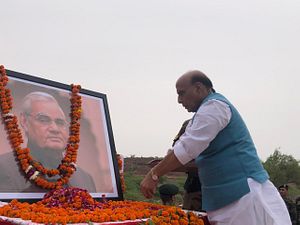Recent remarks by Indian Defense Minister Rajnath Singh on nuclear policy have focused attention once again on New Delhi’s continued commitment to the ‘no first use’ nuclear policy enshrined in its 2003 nuclear doctrine.
Speaking at Pokhran, where India had detonated weaponized nuclear devices in 1998, Singh said “Till today, our nuclear policy is ‘no first use’.” He added: “What happens in future depends on the circumstances.”
As South Asian security scholars Christopher Clary and Vipin Narang write at the Hindustan Times, Singh’s comment, while not an upending of the existing nuclear doctrine in itself, effectively throws “into question India’s commitment to adhere to what is now a crumbling pillar of India’s nuclear doctrine.”
Clary and Narang, in a longer article for International Security, catalogued the long history of Indian officials—in office and out—questioning the wisdom of ‘no first use.’ Atal Behari Vajpayee, the country’s first prime minister, had once, before the promulgation of the 2003 doctrine, even discussed first use: “If they (Pakistan) think we would wait for them to drop a bomb and face destruction, they are mistaken.”
Singh, as they note, has now become “the highest serving Government of India official to explicitly state that India’s no first use policy is neither permanent nor absolute.” (Vajpayee’s above-quoted remark pre-dates the 2003 doctrine.) Unlike one of his predecessors from Indian Prime Minister Narendra Modi’s first term, the late Manohar Parrikar, Singh wasn’t speaking in his personal capacity—albeit while in office—either.
This latest watering-down of the credibility of Indian NFU will serve to validate long-standing suspicions in Islamabad and Beijing regarding Indian intentions. Neither of these nuclear adversaries have ever believed India’s ‘no first use’ policy—just as analysts in New Delhi regularly cast doubt on China’s ‘no first use’ pledge, which has been in place since 1964.
Singh’s decision to make the comment that he did on ‘no first use’ appears highly calculated. After his verbal remarks at Pokhran became news, he followed up with a tweet, reiterating the government’s position.
The tweet repeated the language: “Pokhran is the area which witnessed Atal Ji’s firm resolve to make India a nuclear power and yet remain firmly committed to the doctrine of ‘No First Use’. India has strictly adhered to this doctrine. What happens in future depends on the circumstances.”
Singh followed up with his remark that “India attaining the status of a responsible nuclear nation became a matter of national pride for every citizen of this country,” hinting at perhaps the reasoning on his broader comment on ‘no first use.’
In Vajpayee’s time, the declaration of ‘no first use’ was informed not only by deterrence concerns regarding China and Pakistan, but also with regard to the broader diplomatic project of India’s mainstreaming as a nuclear power outside of the Nuclear Nonproliferation Treaty (NPT).
That effort was largely successful by the mid-2000s for India’s purposes. The U.S.-India civil nuclear cooperation agreement in 2005 cinched that status for New Delhi (under a Congress Party prime minister) in de facto terms and a 2008 waiver from the Nuclear Suppliers Group further signaled India’s bespoke nuclear status as a non-NPT Nuclear Weapons State nuclear weapons possessor.
Singh’s remark, coming on the anniversary of Vajpayee’s death, was then about the legacy that India owed the former Bharatiya Janata Party prime minister. Vajpayee’s prime ministership stewarded early nuclear India through an uncertain time, laying the groundwork for “attaining the status of a responsible nuclear nation.”
Going forward, the “circumstances” that Singh alludes to remain indeterminate, but it takes little imagination to suggest that this government might find itself already in those circumstances. Pakistan’s development of low-yield battlefield nuclear weapons to compress India’s room for conventional military action has now weighed on policymakers and strategic thinkers in New Delhi for years.
Earlier this year, in February, Modi authorized the use of conventional airpower against Pakistani soil after Jaish-e-Mohammed, a Pakistan-based terror group, claimed the largest attack on Indian paramilitary personnel in Kashmir in decades.
The strikes, which surprised most analysts, sought to demonstrate to Pakistan that significant conventional escalation was possible under South Asia’s low nuclear-use ceiling: that Pakistan couldn’t hide behind its nuclear weapons as it continued to avail of proxies to bleed India by a thousand cuts.
In the meantime, as Clary and Narang have exhaustively documented in their International Security article, successive Indian governments—Congress and BJP-led alike—have made significant investments in new precision weaponry and intelligence, surveillance, and reconnaissance capabilities that would serve to underwrite any shift in nuclear doctrine or policy away from ‘no first use.’
The question now is how much further is the current Indian government willing to take its calibrated attempts to ambiguate ‘no first use’? Formally updating the doctrine would be a significant step and doesn’t appear likely.
Then again, under Modi, the Indian government has shown an appetite for taking surprising and significant steps on national security issues without much warning. The February air strikes, the sudden announcement of an anti-satellite weapon test earlier this year, and, more recently, the decision to abrogate Article 370 of the Indian constitution and lock down Kashmir are perhaps examples of a new boldness that might one day—soon—express itself in the realm of nuclear policy.
Modi himself, on the campaign trail, beat the nuclear drum to stir up his nationalist base. At an April 20 rally, he told supporters: “Every other day, they used to say ‘we have nuclear button, we have nuclear button.’ What do we have then? Have we kept it for Diwali?” While that might be written off as just a bit of electioneering theater, it takes on a new ominousness with Singh—one of Modi’s closest confidants and incumbent defense minister—saying what he did on ‘no first use.’

































